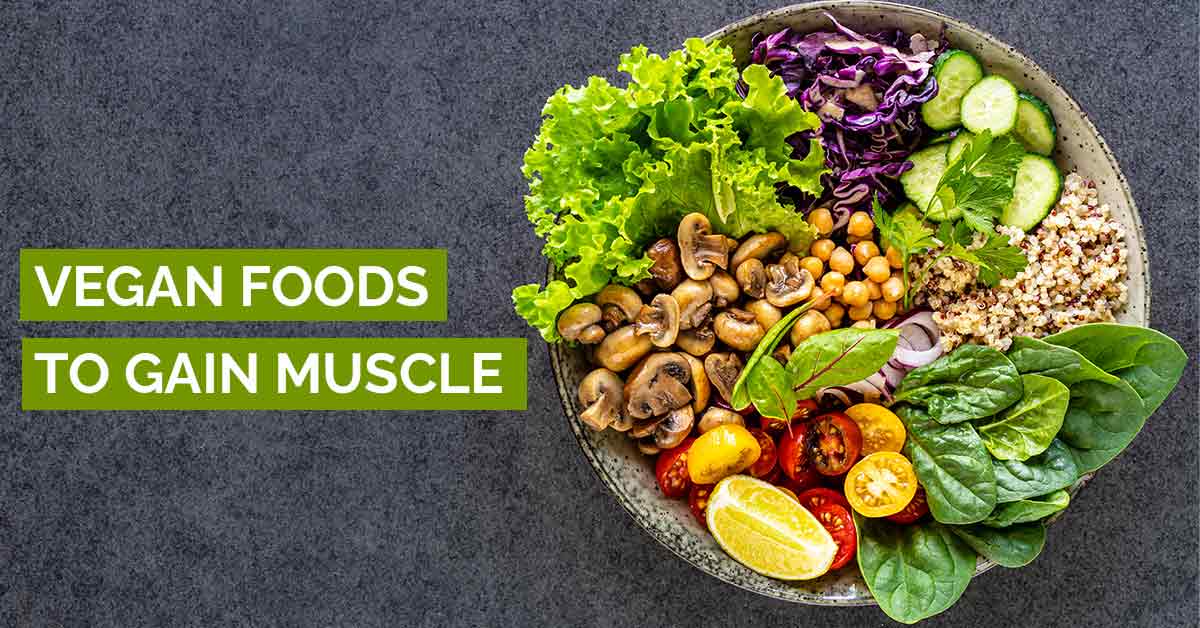Being a vegan and preaching vegetarianism has its challenges. But, many people mistakenly think that one of the most prominent challenges is to build muscle with a vegan diet. This is so because vegan food options contain less amount of protein than non-vegetarian foods.
If you were among them, we’ve got news for you! It’s time for you to change the stereotypical mindset about the protein-rich diet and stop thinking about meat, eggs, and chicken breasts every time anyone exclaims protein! Though vegans can complement their protein needs through the best protein powders in India, they cannot entirely depend on them for their protein needs.
Vegans in their surgery recovery phase, vegan bodybuilders, and vegans aspiring for weight loss- all require an extra amount of protein than the 1.2-1.7 grams per kilogram of body weight. Let us understand why and explore some of the excellent vegan protein food sources.
Why Do You Need Protein-Rich Foods?
Yes, it is a myth that plant-based protein foods are protein deficient. One can fulfill the protein needs for muscle gain or weight loss by adding a combination of protein-rich vegan foods to the diet. One needs protein basically to recover the strained or exhausted muscles after workouts. People involved in intensive training need it the most.
Protein mends the cracks in your muscles and uses the broken muscle to increase its size. This is known as muscle synthesis which is done optimally by protein. This is why your gym trainer keeps telling you to eat eggs, meat, cottage cheese, etc., to speed up your muscle recovery. However, protein needs vary from person to person depending upon height, age, activity level, and of course, fitness goals.
Other than protein, people also require carbs to ramp up the muscle-building process. Carbs deliver the large chunk of energy you employ in your workouts and daily activities. The glycogen stores in the muscles are replenished by the carbs you eat. However, they get depleted as you exhaust the muscles during a workout. Therefore, you should be particular about the intake of both protein and carbs for muscle building. Let us now explore protein-rich vegan foods with an appropriate amount of carbs.
Vegan Protein-rich foods For Muscle Building
If you are a bodybuilder, spending hours in the gym in intensive training, you need a bulk of protein. These vegan sources of protein will help you gain that chiseled body without making you regret your vegan choice of life!
-
Tofu and Tempeh-
When it comes to vegan or vegetarian protein, soy products such as tofu, tempeh, and edamame top the list. Tofu is an unflavoured soy-derived product; thus, it is versatile enough to prepare multiple vegan dishes. Every half cup of tofu contains a whopping 10 grams of protein. In case you are allergic to soy, you can try the alternative Seitan.
-
Seeds-
Seeds such as chia seeds and hemp seeds contain a complete form of protein with 2 grams in every tablespoon. In addition, chia seeds are particularly rich in omega-3 fatty acids and fiber as well. Seeds are again a very versatile category of food that you can sprinkle on a smoothie or salad to enrich its nutritional value and add a crunchy twist.
-
Nuts-
A half cup of peanuts contains an extraordinary 20 grams of protein. Similarly, every 100 grams of peanut butter contains 25 grams of protein. Peanuts are also stuffed with healthy fats; therefore a peanut butter sandwich becomes a satiating snack. Almonds also fall under the category of protein-rich nuts. Every half cup of almonds contains 16 grams of protein with vitamin E as an additional value.
-
Beans and Legumes-
You must have encountered beads and legumes when it comes to vegetarian sources of protein-rich food. Well, it comes as no surprise if we mention it again. Kidney beans, soybeans, chickpeas, and split beans are the winners of this lot, comprising 20-25 grams of protein with decent carbs. In addition, these foods can help you get rid of loose fat as they contain wholesome fiber.
-
Quinoa-
It is a grain that vegans can enjoy to fulfill their partial protein requirements. Quinoa contains 8 grams of protein per cooked cup. The grain is vibrant with other minerals as well, such as iron, magnesium, fiber, etc.
-
Spirulina-
Though not a popular food, spirulina has an excellent amount of protein. It is a simple blue-green algae but is regarded as a kind of vegan food for protein. It has a 70% of protein concentration, certainly more than the protein content of meat and eggs! It is also a versatile vegan protein option, as you can sprinkle spirulina powder on a smoothie or any other dish and enjoy a protein-rich diet.
Nutrition And Muscle Gain Tips For Vegans
-
Don’t skip calories-
Yes, you read that right about calories. Your body requires certain amounts of calories to build and maintain muscle mass. You cannot exclude calories from your diet to build muscle, but, yes, you have to look for healthy calorie-rich foods such as nuts and avocado.
-
Eat protein at the right time-
To get the best out of your protein intake, consume enough protein by dividing it between meals and snacks. Some studies show that drinking protein shakes after workouts can maximally stimulate muscle synthesis and growth.
-
Amino Acids Should be Your Close Aid-
You can consume a diet with varied ingredients to ensure enough storage of the essential amino acids. Amino acids are vital for health as they store and transfer other vital nutrients into the body. You can try these Nature Sutra and throw your worries for amino acids. Utsaha is a complete plant protein powder that contains all 9 essential amino acids with the goodness of multiple plant-based foods.
Conclusion:-
It can be satisfactorily said that vegan sources of protein fulfill the protein requirements for muscle building. Therefore, one can include various options from vegan protein-rich foods and prepare a protein-packed vegan diet plan. To ensure that you eat the right food to improve your particular health condition, consult a health professional to seek advice.









